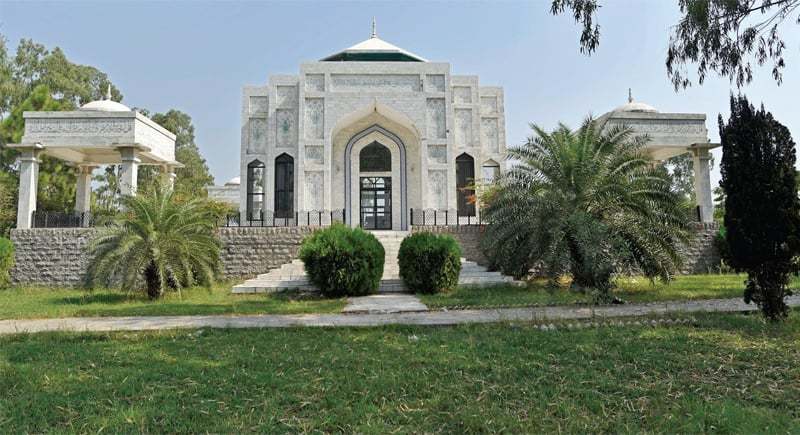Sultan Shahab-ud-Din Ghori
His real name was Muhammad Bin Sam. He was born to Bahauddin Sam bin Hussain in 1150. He got high ranks in Army because of his skills.
In 1175, he captured Multan and Uch Sharif by invasion. In 1179, he raided Gujrat. In 1181, he attacked Lahore and set the foundation of the Ghori empire by defeating Sultan Mehmood Ghaznavid. In 1911, he built the Sialkot fort. The armed troops of his army defeated Rajput Prithvi Raj Chohan and his allies, the emperors of Delhi and Ajmer military. They again won the battle in 1192.
He became the king after the death of his elder brother Gias-ud-Din. In 1206, he traveled to Lahore to crush a rebellion. He stayed in Dhamiak village district Jhelum after the eradication of the rebellion. A Hindu attacked him and his three guards while he was offering evening prayer. They were all martyred.
He was buried on the death spot according to his will.
The Indian army named their missile after Prithvi Raj since Shahab-ud-Din had defeated him two times, the Pakistan army named their medium-range ballistic missile Ghori Missile to give him a tribute. The tomb of this brave general is beyond Dina, 13 km on the right side of the Chakwal motorway in Dhamiak village.

Key information about Warrior Sultan Shahab-ud-Din Ghori
| Attribute | Warrior Sultan Shahab-ud-Din Ghori |
|---|---|
| Full Name | Shahab-ud-Din Ghori |
| Title | Sultan |
| Born | 1149 |
| Died | 15 March 1206 |
| Birthplace | Shywa, Ghor Province, present-day Afghanistan |
| Dynasty | Ghurid Dynasty |
| Role | Founder of the Ghurid Empire, military leader |
| Notable Campaigns | Conquest of Ghazni (1173), Expansion into Northern India |
| Contribution | Played a key role in the establishment of the Delhi Sultanate in Northern India |
| Major Battles | Battle of Tarain (1191), Battle of Tarain (1192) against Prithviraj Chauhan |
| Death | Assassinated in 1206 by Khokhar tribesmen |
| Legacy | Laid the foundation for the Ghurid Empire and influenced the political landscape in Northern India |
Warrior Sultan Shahab-ud-Din Ghori
In the annals of history, the name Shahab-ud-Din Ghori resonates as that of a formidable warrior and the founder of the Ghurid Empire. Born in 1149 in Shywa, Ghor Province (present-day Afghanistan), Shahab-ud-Din Ghori left an indelible mark on the medieval world through his military prowess and strategic acumen. This article delves into the life and legacy of this warrior sultan, exploring his conquests, major battles, and the lasting impact he had on the political landscape of Northern India.
Early Life and Rise to Power
Shahab-ud-Din Ghori hailed from the Ghorid tribe, a group with a strong martial tradition. Little is known about his early years, but by the late 12th century, he emerged as a prominent figure in the region. Ghori, along with his brother Ghiyath-ud-Din, seized control of the Ghurid dynasty after the death of their uncle.
Military Campaigns and Conquests
The military campaigns led by Shahab-ud-Din Ghori were marked by audacity and strategic brilliance. In 1173, he captured the city of Ghazni, a significant center in the region. This conquest laid the foundation for the expansion of the Ghurid Empire into the Indian subcontinent.
Expansion into Northern India
Shahab-ud-Din Ghori’s most notable and consequential campaigns were in Northern India. The Battle of Tarain, fought in 1191 against the formidable Rajput ruler Prithviraj Chauhan, showcased Ghori’s tactical prowess. Although he faced defeat in this battle, Ghori returned the following year in 1192 for the Second Battle of Tarain, where he emerged victorious. This victory paved the way for the establishment of the Delhi Sultanate, with Ghori as its first Sultan.
Legacy and Impact
Shahab-ud-Din Ghori’s legacy lies not only in the territories he conquered but also in the political structures he established. The Delhi Sultanate, which endured for centuries, was a testament to his vision and leadership. Ghori’s conquests in Northern India laid the groundwork for subsequent Muslim rule in the region, influencing the course of Indian history.
Major Battles and Assassination
The Battle of Tarain, both in 1191 and 1192, are pivotal chapters in Ghori’s military career. His victory in the latter battle solidified his control over Northern India. However, his reign was cut short when he was assassinated in 1206 by Khokhar tribesmen while on an expedition.
Sultan Shahab-ud-Din Ghori
Sultan Shahab-ud-Din Ghori, born in 1162 in the Ghor region of present-day Afghanistan, emerged as a formidable warrior and a key figure in medieval Islamic history. Founder of the Ghurid dynasty, Ghori’s influence extended far beyond his birthplace, shaping the destiny of the Indian subcontinent.
The Battle of Tarain (1191)
Ghori’s military prowess came to the forefront in the Battle of Tarain in 1191, where he secured a decisive victory over Prithviraj Chauhan. This historic battle marked the beginning of Islamic rule in Northern India and showcased Ghori’s strategic brilliance in navigating the diverse terrains and challenges of the subcontinent.
Visionary Leadership
Beyond conquest, Ghori was a visionary ruler committed to establishing a stable and enduring empire. His strategic governance included the appointment of trusted governors to oversee different regions, fostering unity among the diverse populations. This laid the foundation for the Delhi Sultanate, leaving a lasting impact on the cultural and architectural landscape of India.
Clash of Titans
Ghori’s encounters with the legendary Indian warrior Prithviraj Chauhan added a complex layer to his legacy. Their rivalry, celebrated in historical accounts and epic poetry, symbolized the clash of civilizations and highlighted the intricate interplay of power, ambition, and cultural exchange in the medieval period.
Legacy and Enduring Impact
Sultan Shahab-ud-Din Ghori’s life and achievements constitute an intriguing chapter in Islamic and Indian history. His legacy extends beyond mere conquest, encompassing the enduring impact of institutions and cultural exchanges that characterized his reign. Ghori’s story serves as a testament to the complexities of historical narratives, where warriors are not only agents of conquest but also architects of enduring civilizations.

